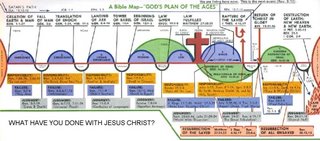While attending this church they offered a class in Sunday School called "God's Plan For the Ages". I was told that this would explain God's working through the ages. This intrigued me as I had never heard of this before. So I signed up for the class which was to last three months. So in March of 1980 I walked into class with my bible and a open mind. The first thing they handed out was a map reproduced here:

This blew me away I had never seen anything like this before. I was excited, this seem to outline the whole of recorded history as regards to the bible, in a neat and concise manner. I was told that there were seven distinct dispensations and during each dispensation Man was given a test and how he responded to that test determined whether or not he was saved.
Now let me state right now that most of the Dispensationalists that I have talked to since I was first taught this do state that what I just wrote isn't what is currently being taught. Most do assert that salvation is entirely by grace and that during the various dispensations that people were saved by grace. However, I spent a long two weeks listening once again to the tapes that I have kept from that teaching and I can state that what I previously written was what was being taught. Now the best I can say about this is that it is more like classical Scofieldian Dispensationalism than say what Ryrie had reconstructed Dispensationalism into or what is now Progressive Dispensationalism.
One of the most stirring memories of this time was when the teacher said "You should all be glad that we are living right now in the dispensation of Grace (aka the Church Age) because during the next dispensation, the Kingdom Age, the millennium, we will be judged by our very thoughts! Anyone who has a thought against Christ will be struck down dead!" Can you imagine this? The millennial reign being a source of terror to some.
Well I took it all in. This was the truth of Bible to me. Now in my naïveté I had no idea about the history of Dispensationalism I thought it was standard Protestant theology. This is what Luther had taught right? So when it came to studying the Old Testament it was always through the lens of which dispensation was going on at the time. Same with the New Testament. Matthew, Mark, Luke, and John all had been the teaching of Christ during the Law dispensation so that it didn't apply now it would apply during the millennial reign of Christ. What was applicable to me now was the Pauline letters (not Peter, Jude, or John they were for the Jewish Christians) because Paul was the apostle to the gentiles and the Church was that mystery that had never been talked about at all in the Old Testament.
To be continued...
Post Script: I'm trying to finish this by Thanksgiving or right after.
3 comments:
Me write anything important? Don't make me live up to stuff like that!!! I can't do it. I need a lower standard, like the one given to me at Pyro, "Entertaining".
Peter, This is where I started to have problems with Dispensationalism too..."Same with the New Testament. Matthew, Mark, Luke, and John all had been the teaching of Christ during the Law dispensation so that it didn't apply now it would apply during the millennial reign of Christ. What was applicable to me now was the Pauline letters (not Peter, Jude, or John they were for the Jewish Christians) because Paul was the apostle to the gentiles and the Church was that mystery that had never been talked about at all in the Old Testament."
I see the Beattitudes as descriptions of Jesus our Lord, and, subsequently, the regenerate man as God works to conform us to the image of His Son. Also, one of the ways He conforms us to that image is by our digging into His Word (2 Cor. 3:18; Romans 12:1-2). If that particular brand of dispyism is correct then a huge chunk of the word is not worthy of our meditation, and does not qualify as part of God's plan for conforming us into His Son's image. That is where I got turned off from Scofield and that brand of Dispensationalism.
Ahhh...much better. Still a cliff-hanger, but not as bad as Part 3. Keep 'em coming.
Post a Comment